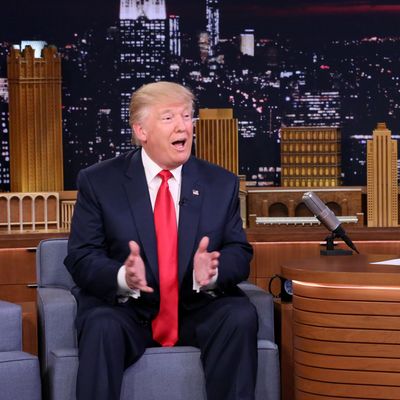
Jokes aren’t told just for laughs. All of us neurotic, upright apes deploy humor for a variety of social functions. We use it to relieve anxiety, mocking the things that frighten us to make them seem less menacing — and to make ourselves feel less alone. We use it to air taboo thoughts, safely indulging our Oedipal complexes, one “Yo mama” joke at a time. We use it to gently police the norms of our social group, or to denigrate those who fall outside our tribe. Some use it to make the more athletic, beautiful kids invite us to their parties, or to make our significant others less mad when we forget to do the dishes, or to get our taciturn children to say something to us on the drive back from school.
And some use it to poke fun at the absurd pretenses of the powerful. Especially when Donald J. Trump decides to run for president.
And yet, if the Trump campaign has offered an astronomical number of opportunities to satirists, it has also presented them with a profound challenge. As Isaac Davis famously argued, satire isn’t necessarily the right tool for taking on political extremists.
But the problem with satire is not merely that it is unlikely to dissuade committed fascists from their cause. The problem with satire is that it’s funny: Even as Jon Stewart made his audience more keenly aware of the Bush administration’s deceptions, he also made them more comfortable living under a mendacious government. In Humor As a Social Corrective, Avner Ziv writes about satire’s paradoxical power to simultaneously liberate and pacify:
In every oppressive regime there is this kind of underground humor, and it fulfills an important function: Laughter shared by the oppressed at the expense of the oppressor reduces fear and helps people to go on living under the regime with more ease. Totalitarian regimes possibly do themselves a disservice in preventing manifestations of humor against themselves, for laughter may be a safety valve for the release of tension and frustration … It is to be supposed that in democratic societies, in which freedom of expression is given to political humor, satire indirectly serves the interests of the government. The possibility of ventilating feelings against the state by means of laughter offers release; the hostility might otherwise be demonstrated in far more violent forms, even outright rebellion.
In most cases, laughter is preferable to violent insurrection. But concerted efforts to advance a more just political order are preferable to both.
All of which is to say: Even truly biting satire can carry an element of social irresponsibility if a comedian comforts her audience instead of mobilizing it. One of the most distinct and admirable features of John Oliver’s HBO program has been its forthright attempts to do the latter. Sometimes these efforts are dumb (Drumpf), but others have been genuinely influential.
The challenge of executing socially responsible satire is all the more acute in times of political emergency — like when the Republican Party chooses an authoritarian demagogue with a white nationalist following as its presidential nominee.
And this is why Jimmy Fallon’s interview of Trump Thursday was worse than lame. The least a comedian can do when faced with a figure like Trump is throw his mendacity and hatefulness into sharp relief. Even if the punch line provides some counterproductive catharsis, at least you raised a bit of awareness.
But Fallon did the opposite. He obscured what makes Trump dangerous, by needling his pretenses in the gentlest possible way. He did not mock the absurdity of Trump claiming to care about the challenges facing women in the workplace while soliciting advice from an alleged workplace predator, or of his pretending to care about the greater good while using his charity’s funds to purchase a painting of himself.
Instead, Fallon mocked Trump for modulating the register of his voice over the course of the campaign.
He didn’t confront Trump with his most hateful remarks. Rather, Fallon invoked those remarks in vague, morally neutral terms, mining laughs from the tension, while leaving Trump’s bigotry unexamined — feeding his audience catharsis, without even confrontation.
“Thank you for giving us the material that we’re doing,” Fallon said. “But you say some shocking things.”
“But I’m trying not to,” Trump replied, mugging to the audience, who rewarded him with raucous applause.
This dynamic held for the remainder of the interview, with the Tonight Show host framing Trump as a comedic sidekick, rather than as a threat to our democracy.
Jimmy Fallon was not going to save us from a Trump presidency with a few cutting barbs. But on Thursday night, he sat across from a demagogue and tried to tell jokes, just for laughs. And that shtick is something much worse than unfunny.






























